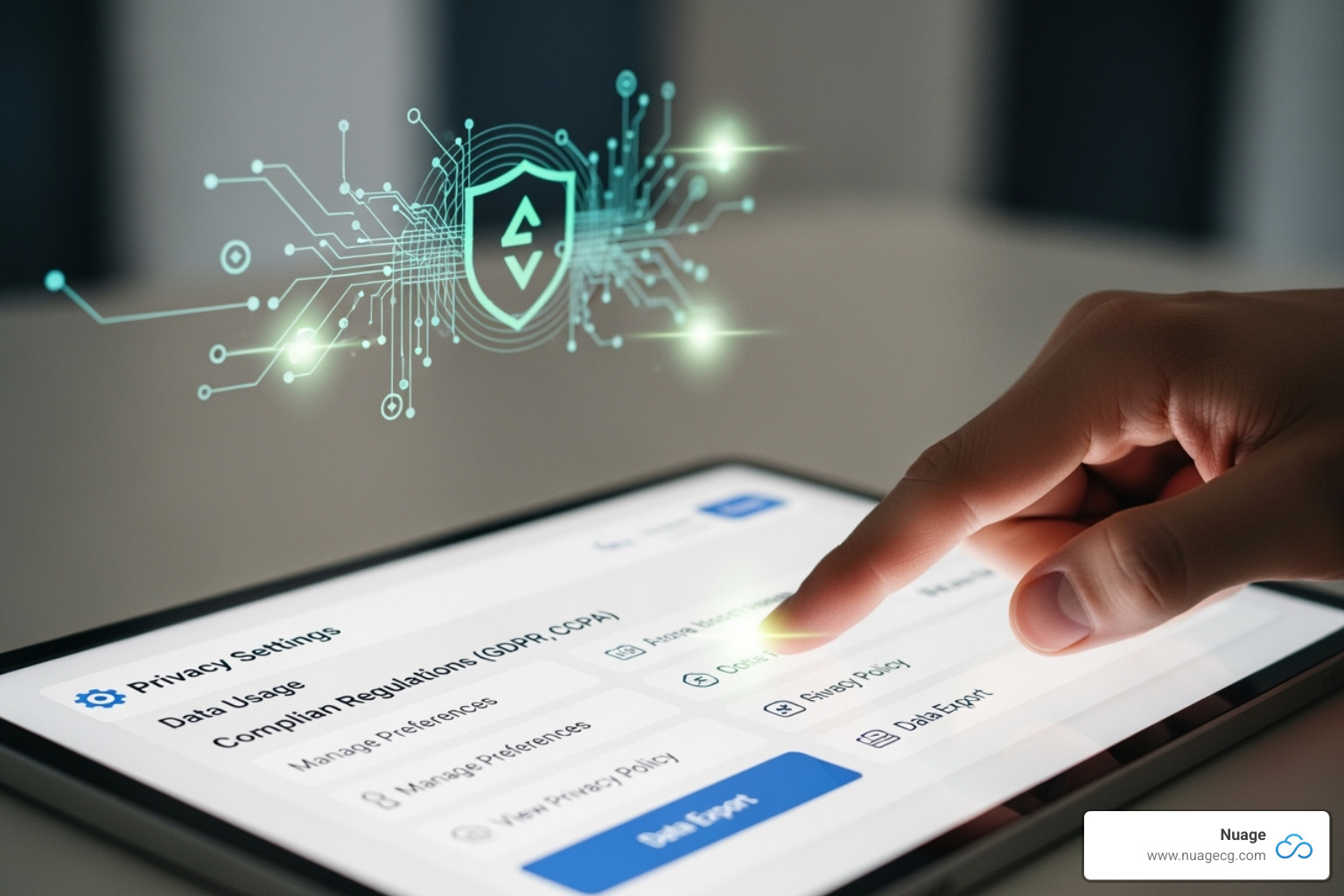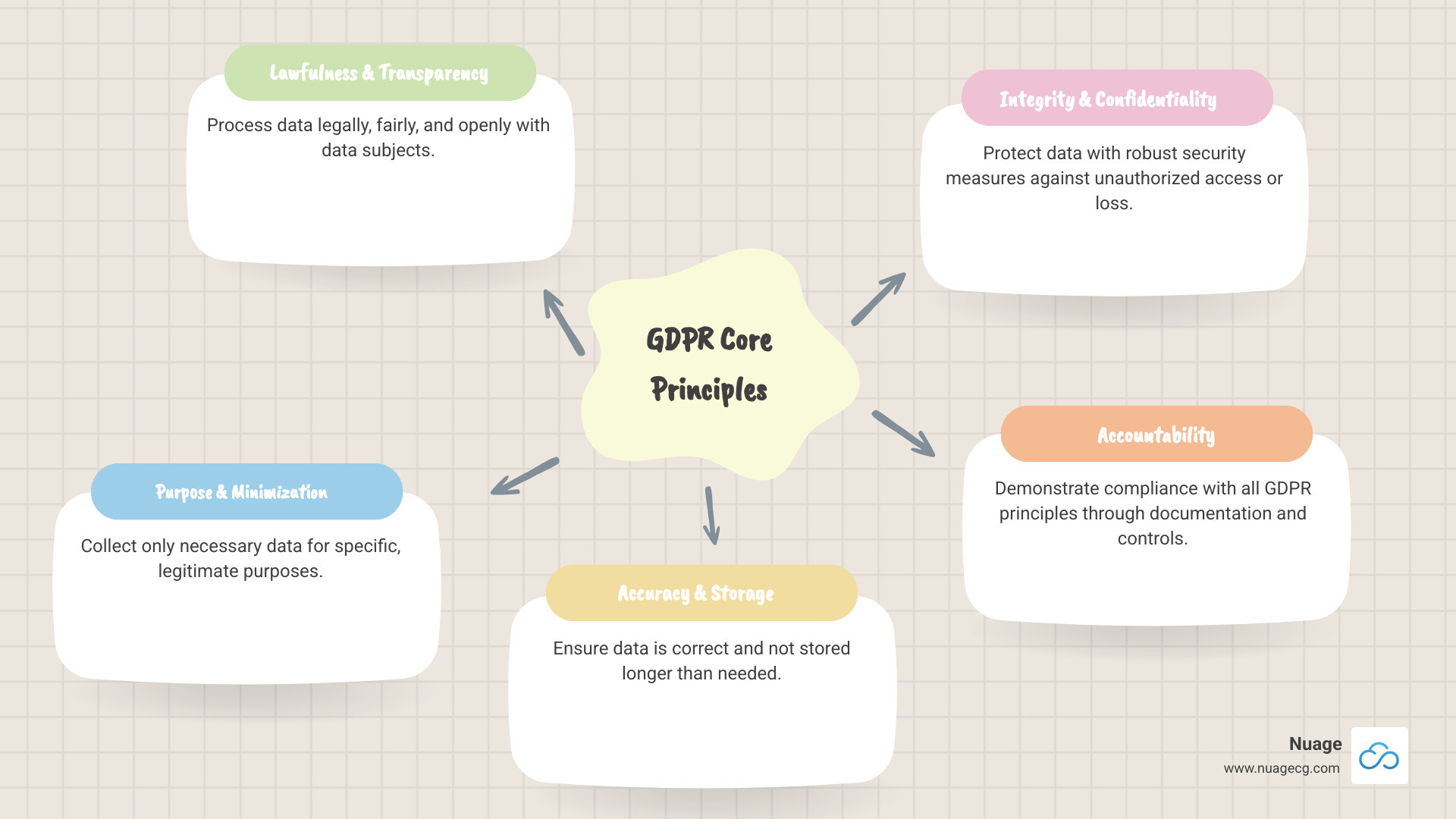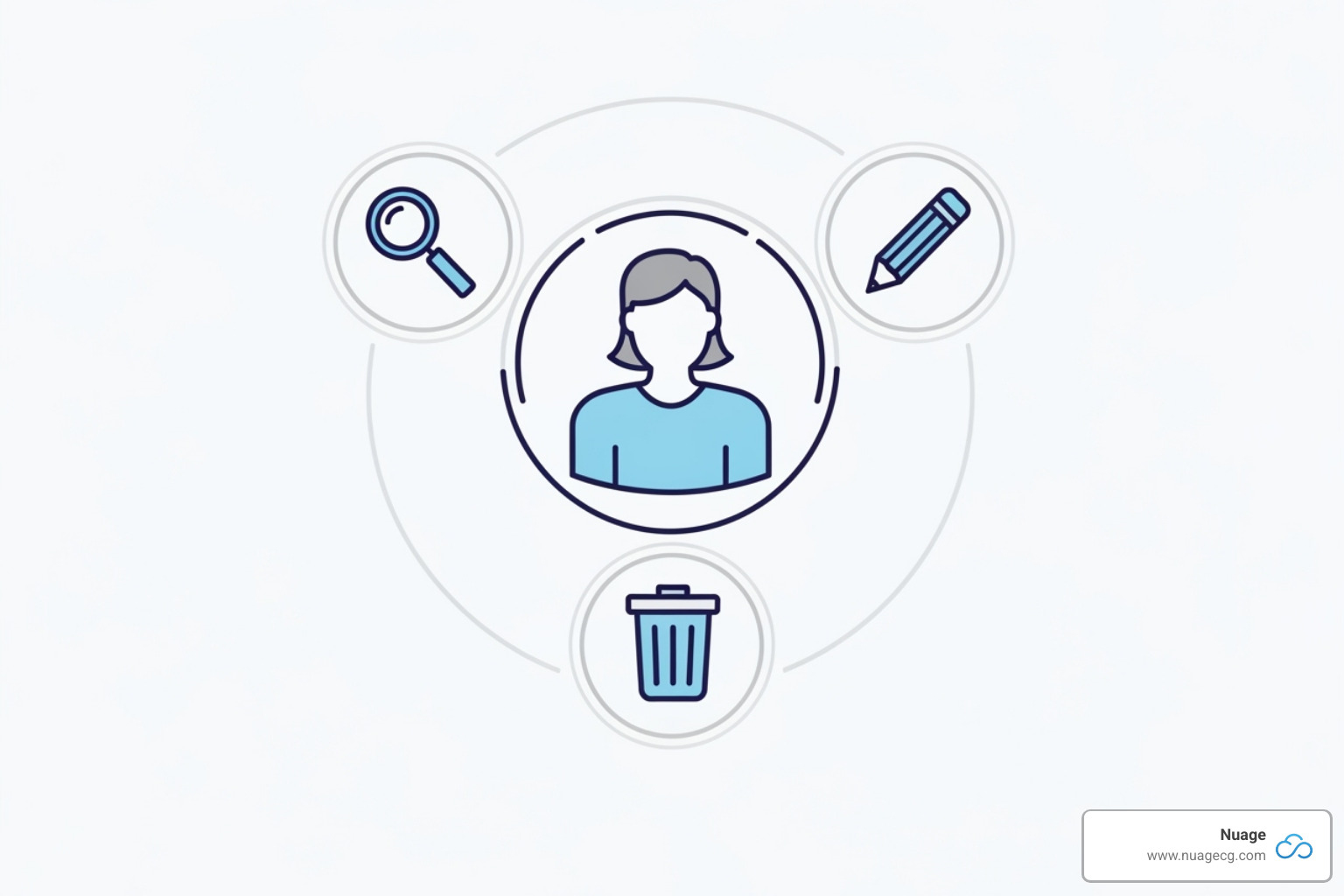Why NetSuite GDPR Compliance Matters for Your Business

NetSuite GDPR compliance is critical for any business using NetSuite to process data from EU residents. While NetSuite offers tools to support compliance, you are ultimately responsible for correct system configuration, managing data subject rights, and ongoing governance.
Quick Answer: Key Steps to NetSuite GDPR Compliance
- Sign Oracle’s Data Processing Agreement (DPA) with EU Standard Contractual Clauses (SCCs).
- Configure role-based access controls to limit personal data access.
- Implement consent tracking with custom fields and forms.
- Set up saved searches for data subject requests.
- Use NetSuite’s PI Removal tool for erasure requests.
- Enable audit trails and monitor login activity.
- Conduct regular audits of configurations and data retention policies.
- Train employees on GDPR and data handling procedures.
The stakes are high. GDPR penalties can reach €20 million or 4% of global annual revenue, whichever is greater. Non-compliance also damages customer trust and can harm business opportunities with EU organizations.
NetSuite provides a strong foundation, holding ISO 27001, ISO 27018, SOC 1, and SOC 2 certifications. Oracle also adheres to EU-approved Binding Corporate Rules and the EU Cloud Code of Conduct. However, these certifications do not guarantee automatic compliance.
I’m Louis Balla, CRO and partner at Nuage. With over 15 years of experience, I’ve helped businesses optimize NetSuite for security and compliance, turning data protection into a competitive advantage.

Understanding GDPR and the Shared Responsibility Model in NetSuite
The General Data Protection Regulation (GDPR) fundamentally changed how businesses handle personal data. If you process data from anyone in the EU, GDPR applies to you. It’s about respecting privacy and giving people control over their information.
NetSuite GDPR compliance operates on a shared responsibility model. Oracle NetSuite, as the Data Processor, provides the secure infrastructure and tools. You, as the Data Controller, are responsible for how you use those tools and manage the data. Understanding this distinction is critical.

NetSuite’s Responsibilities as the Data Processor
As the Data Processor, Oracle NetSuite manages the secure infrastructure. Their responsibilities include:
- Secure Infrastructure: NetSuite’s security approach includes strong encryption, role-based access controls, and robust password policies built into the platform’s foundation.
- Legal Framework: Oracle provides a Data Processing Agreement (DPA) with EU, UK, and Swiss Standard Contractual Clauses (SCCs). For international transfers, Oracle’s Binding Corporate Rules for Processors (BCR-p) offer a robust legal framework.
- Certifications and Standards: NetSuite maintains numerous certifications, including SOC 1 Type II, SOC 2 Type II, ISO 27001, and ISO 27018. They also adhere to the EU Cloud Code of Conduct, as verified on the public registry.
- Data Residency and Security: NetSuite offers options for hosting data in EU data centers to meet data residency requirements. Their data centers also employ comprehensive physical security measures.
Your Responsibilities as the Data Controller
As the Data Controller, you are in the driver’s seat. Your key responsibilities include:
- Data Governance and Lawful Basis: Establish clear internal policies for data protection and document the lawful basis for all personal data you process, whether it’s consent, contractual necessity, or legitimate interest.
- Consent Management: If relying on consent, you must obtain it properly, document it, and make it easy for individuals to withdraw. Pre-checked boxes are not compliant.
- Data Mapping: You must know what personal data resides in your NetSuite ERP Software, where it came from, and why you have it. This includes mapping all data flows and assessing third-party integrations.
- NetSuite Configuration: Proper configuration is where theory meets practice. This involves setting up role-based access controls, creating custom fields for consent, and implementing data retention policies. This is where NetSuite ERP Customization is invaluable.
- Managing Data Subject Requests (DSARs): You need clear processes to handle requests for access, correction, or deletion within GDPR’s 30-day timeframe.
- Employee Training and Third-Party Management: Your team is your first line of defense and must be trained on GDPR. Additionally, any third-party application connected to NetSuite requires its own Data Processing Agreement.
The shared responsibility model requires both a secure platform and thoughtful implementation. NetSuite provides the tools; your job is to use them strategically to protect personal data.
Configuring NetSuite’s Core Features for GDPR Compliance
Now that we understand the shared responsibility model, let’s get practical. As Data Controllers, we must configure NetSuite’s features to meet GDPR requirements. NetSuite provides a customizable toolkit, but you need to know how to use it effectively.
For a great overview of the platform’s capabilities, watch Oracle’s video: How NetSuite Works With You to Secure & Manage Your Data (Video).
Data Minimization and Consent Management
GDPR requires that you only collect what you need, and only with permission. This principle reduces your risk exposure.
- Data Minimization: Audit your data collection points. Review every form and field in NetSuite. If you don’t need a piece of data, don’t collect it. Use role-specific forms to limit data exposure by design, showing different fields to different users. This is a key part of effective NetSuite ERP Customization.
- Consent Management: Create custom fields on customer and contact records to track consent status, date, and method. For SuiteCommerce sites, use explicit opt-in mechanisms—pre-checked boxes are not compliant. Withdrawing consent must be as easy as giving it. NetSuite’s system notes automatically create an audit trail of changes to consent fields, providing verifiable proof.
Best Practices for NetSuite GDPR Compliance Security
Ongoing security configuration is central to NetSuite GDPR compliance. While NetSuite provides the secure infrastructure, your setup determines its effectiveness.
- Role-Based Access Controls (RBAC): Implement the Principle of Least Authority (POLA), giving each user only the access they need. NetSuite allows for granular control, down to the field level, which can dramatically reduce risk.
- Authentication and Encryption: Enforce strong password policies and multi-factor authentication (MFA). NetSuite automatically encrypts data both at rest and in transit, but your access controls determine who can view it.
- Oversight and Monitoring: Use NetSuite’s Governance, Risk, and Compliance (GRC) capabilities to proactively identify risks. Learn more about NetSuite’s GRC capabilities to support your compliance framework. We also recommend setting up continuous monitoring to detect unusual access patterns or data exports.
Accountability and Reporting
GDPR requires you to prove your compliance. NetSuite’s reporting and auditing features are essential for this.
- Custom Reporting: Leverage NetSuite Reporting Tools to create reports that summarize your compliance posture, showing where personal data resides, who has access, and consent statuses.
- Saved Searches: Configure saved searches to locate personally identifiable information (PII) across your system. Set up email alerts for real-time visibility into changes to sensitive data.
- Audit Trails: NetSuite’s system notes provide a comprehensive audit trail of every record change. The login audit trail tracks all authentication attempts. Regularly reviewing these logs helps you spot suspicious activity and demonstrate compliance.
Managing Data Subject Rights: A Step-by-Step Guide in NetSuite
One of GDPR’s most significant aspects is the empowerment of individuals with control over their personal data. As the Data Controller, you are legally obligated to honor these rights, typically within a strict 30-day response window. NetSuite provides practical tools to manage these Data Subject Access Requests (DSARs) efficiently.

Right to Access and Data Portability
When an individual asks for a copy of their data, you must be ready to respond. This is where NetSuite’s search and export capabilities are invaluable for your NetSuite GDPR compliance efforts.
- Locating Data: Use NetSuite’s saved searches to quickly pull all personal data associated with an individual. For more complex requests spanning custom records, SuiteScript can automate the retrieval process, ensuring accuracy and saving time.
- Exporting Data: NetSuite allows you to export information in standard, machine-readable formats like CSV, fulfilling GDPR’s data portability requirement. This data can be further analyzed using NetSuite Data Analytics tools if needed.
Right to Rectification
Individuals have the right to request corrections to inaccurate personal data.
The simplest approach is to empower users to update their own information via NetSuite’s customer or employee portals. For internal corrections, authorized staff can edit records directly. Crucially, every change is automatically logged in NetSuite’s system notes, providing a verifiable audit trail that you have addressed the request.
Right to Erasure (‘Right to be Forgotten’)
This well-known right allows individuals to request the deletion of their personal data under certain conditions.
NetSuite includes a dedicated Personal Information Removal tool to address these requests. This critical feature allows administrators to either anonymize data (making it non-identifiable while retaining it for analytics) or permanently delete it from records, system notes, and logs.
We help clients develop clear, documented workflows for handling erasure requests to ensure consistency and a repeatable process. Your policy should also address how personal data is removed from backups and archives, typically through a defined retention schedule. With a 30-day clock on DSARs, having these processes ready is essential for compliance.
Maintaining Compliance: Audits, Breaches, and Data Transfers
Achieving initial NetSuite GDPR compliance is a milestone, not a finish line. GDPR demands continuous vigilance and regular check-ups to adapt as your business and regulations evolve. Think of it as a maintenance schedule for your compliance program.

Incident Response and Data Breach Notification
Despite strong security, breaches can happen. GDPR’s 72-hour notification rule is one of its most stringent requirements. You have 72 hours from awareness of a breach to report it to the supervisory authority.
Preparation is key. We help clients develop a clear breach response plan outlining containment, investigation, and communication protocols. NetSuite’s audit trails and saved search alerts for unusual activity (like large data exports or bulk record changes) are invaluable for investigation and early detection. Documenting all incidents within NetSuite is crucial for accountability and regulatory reporting.
International Data Transfers
If you process data from EU residents, any international data transfers must have proper legal safeguards. Oracle has done much of the heavy lifting here.
- Legal Mechanisms: Oracle’s global Data Processing Agreement (DPA) incorporates EU, UK, and Swiss Standard Contractual Clauses (SCCs). These are pre-approved legal tools that extend GDPR’s protections across borders.
- Corporate Rules: Oracle’s Binding Corporate Rules for Processors (BCR-p) provide an additional layer of protection for data transfers within the Oracle corporate family.
- Data Residency: For businesses with strict requirements, NetSuite offers EU data residency options, allowing you to keep data physically located within EU data centers.
A Checklist for Ongoing NetSuite GDPR Compliance
Maintaining compliance requires consistent attention. Use this checklist for your regular compliance health check.
- Schedule periodic audits of NetSuite configurations (quarterly is a good practice) to spot configuration drift.
- Regularly review user roles and permissions to maintain the Principle of Least Authority, especially when employees change roles.
- Provide continuous employee training on data privacy to build a culture of awareness and reduce human error.
- Review and update data retention policies to ensure you aren’t keeping data longer than necessary.
- Monitor third-party NetSuite Integration Services for compliance, as their gaps can become your gaps.
At Nuage, we help establish sustainable compliance practices that protect customer data and build trust. If you’re looking to optimize your NetSuite environment, we’re here to help.
Frequently Asked Questions about NetSuite GDPR Compliance
Throughout our 20 years helping businesses with digital change, we’ve heard many questions about NetSuite GDPR compliance. Here are the most common ones.
Is NetSuite automatically GDPR compliant?
No. While NetSuite provides a secure, compliant framework and powerful tools, compliance is a shared responsibility.
Oracle NetSuite, the data processor, secures the infrastructure and maintains certifications. However, your business, as the data controller, is responsible for properly configuring the system, establishing data governance policies, and managing user access to meet GDPR requirements. NetSuite gives you a secure vehicle, but you must drive it according to the rules.
How does NetSuite handle the ‘Right to be Forgotten’?
NetSuite has a native Personal Information (PI) Removal tool designed to address erasure requests (the ‘Right to be Forgotten’).
This feature allows administrators to either anonymize or permanently delete personal data from specific records, system notes, and logs. When an individual exercises this right, you have the technical means within NetSuite to fulfill the request efficiently and document your compliance.
What are the biggest GDPR challenges for NetSuite users?
Based on our experience, three challenges consistently arise for businesses on their NetSuite GDPR compliance journey:
- Data Mapping Complexity: Identifying and mapping all personal data flows across a customized NetSuite system can be complex. It requires methodical work to understand where PII lives and how it moves.
- Third-Party Integration Compliance: Your NetSuite instance likely connects to other systems (payment processors, marketing tools, etc.). Each integration must also be GDPR compliant with a proper Data Processing Agreement in place.
- Continuous Vigilance: GDPR is not a one-time project. It requires an ongoing commitment to regular audits, employee training, and adapting to regulatory changes.
Following NetSuite Implementation Best Practices from the start can significantly ease these challenges by building compliance into your environment from day one.
Conclusion: Achieve and Maintain Compliance with Confidence
Here’s the truth: NetSuite GDPR compliance isn’t a box you check once and forget about. It’s an ongoing commitment that evolves with your business, your data, and the regulatory landscape itself. But that doesn’t mean it has to be overwhelming.
The shared responsibility model is key: Oracle NetSuite handles infrastructure security and processor obligations, while you, the Data Controller, configure the system, manage access, and govern your data. NetSuite provides a powerful toolkit—from role-based access controls to the PI Removal tool—to meet GDPR’s requirements. The key is proactive configuration and regular maintenance. These are not just compliance tasks; they are investments in customer trust.
And let’s be honest about what’s at stake. Beyond the potential fines of up to €20 million or 4% of global revenue, there’s something far more valuable on the line: your customers’ trust. In today’s digital economy, demonstrating that you take data protection seriously isn’t just about avoiding penalties—it’s a competitive advantage. Customers want to do business with companies they can trust with their personal information.
As a NetSuite Optimization team with over 20 years of experience in digital change, we at Nuage understand that every business is unique. Your data flows are different. Your customizations are different. Your compliance challenges are different. That’s why we don’t just point you to documentation and wish you luck. We partner with you to understand your specific needs, tailor your NetSuite environment to meet them, and support you through every stage of your compliance journey.
We help you map your data flows, configure your access controls, set up automated compliance checks, and develop clear processes for handling data subject requests. We ensure your third-party integrations are compliant and your team is trained. We’re not here to sell you software—we’re here to help you optimize the investment you’ve already made in NetSuite.
Ready to transform your compliance from a burden into a strength? To learn more about how we can optimize your NetSuite environment for security and compliance, explore our NetSuite solutions. We’re your NetSuite Optimization Engine, and we’re ready to help you thrive securely in the digital age.